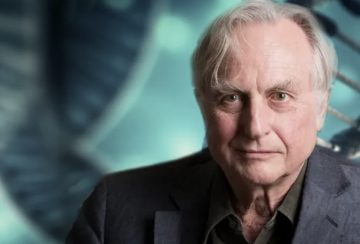Richard Dawkins at The Poetry of Reality:
 The collective power endowed by language is captured in the legend of the Tower of Babel, where it threatened even God himself. “Go to,” God said, “Let us go down, and there confound their language, that they may not understand one another’s speech.” And lo, as a result of quasi-evolutionary divergence, we speak many thousands of mutually unintelligible tongues, the exact number undefined, mostly because dialect grades into language so we can’t decide where one language ends and the next begins. This smearing out is seen both across geographical space (think English worldwide) and through historical time as languages evolve through the centuries (try reading Chaucer). Nevertheless, because language is partly digital, chunked into the discrete semantic units that we call words, it is capable of great fidelity of transmission, especially in written forms. Yet, despite being thus capable, precious little verbal information from our dead ancestors filters down.
The collective power endowed by language is captured in the legend of the Tower of Babel, where it threatened even God himself. “Go to,” God said, “Let us go down, and there confound their language, that they may not understand one another’s speech.” And lo, as a result of quasi-evolutionary divergence, we speak many thousands of mutually unintelligible tongues, the exact number undefined, mostly because dialect grades into language so we can’t decide where one language ends and the next begins. This smearing out is seen both across geographical space (think English worldwide) and through historical time as languages evolve through the centuries (try reading Chaucer). Nevertheless, because language is partly digital, chunked into the discrete semantic units that we call words, it is capable of great fidelity of transmission, especially in written forms. Yet, despite being thus capable, precious little verbal information from our dead ancestors filters down.
But there is another language, also digital, of far greater precision and fidelity of transmission, which does preserve ancestral information, not through a paltry few generations but through hundreds of millions; a parallel language, which is not a human monopoly but is shared by all life: all animals, fungi, plants, bacteria, and archaea; a truly universal language that doesn’t suffer the confusion of dialect drift or trans-generational decay. Nor does it fall victim to the cumulative inflation of my opening fantasy, because it does not grow with each generation. As every schoolchild knows, acquired characteristics are not inherited. The genetic database changes, not cumulatively but by subtraction and addition approximately keeping pace with each other.
More here.
